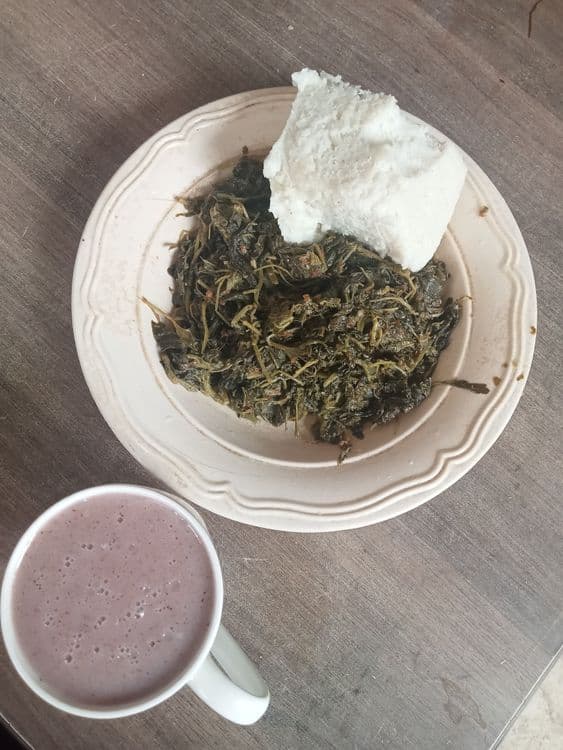
This recipe brings together three iconic Kenyan dishes: Ugali, Whole-Leaf Managu, and Wimbi Porridge. Ugali, a staple cornmeal dish, pairs perfectly with the earthy flavors of traditional African nightshade (Managu). Wimbi Porridge, made from millet flour, is a comforting and nutritious way to start your day. These dishes are simple to prepare and offer a taste of authentic Kenyan cuisine.
Chefadora AI has the answer - timers, swaps, step-by-step help.
Boil water in a sufuria.
Slowly add maize flour while stirring with a mwiko to avoid lumps.
Keep stirring until it thickens into a firm, smooth mass.
Add more flour if needed for firmness and cook while pressing.
Let it steam for 2–3 minutes, then shape it into a dome.
Serve hot with vegetables or stew.
Clean managu thoroughly, removing any thick stems or yellow leaves.
Boil the whole leaves in water for 5–8 minutes to soften and reduce bitterness. Drain.
In a clean sufuria, heat oil or ghee. Fry onions until golden.
Add tomatoes and cook until soft and saucy.
Add boiled managu and gently stir to mix. Avoid breaking the leaves.
Add salt. Optionally, add milk or cream for richness and simmer 2 more minutes.
Serve hot with ugali.
In a cup, mix millet flour with cold water to make a smooth slurry.
Boil 1.5 cups of water in a sufuria.
Slowly add the slurry while stirring continuously to avoid lumps.
Add salt and optional ginger.
Simmer for 10–15 minutes, stirring occasionally.
Add milk and sweetener. Simmer another 2 minutes.
Serve hot in a cup or bowl.
For a firmer ugali, add more maize flour gradually while stirring.
To reduce the bitterness of managu, ensure you boil and drain the leaves properly.
For a creamier wimbi porridge, use whole milk or add a splash of cream.
Serve ugali and managu immediately after cooking for the best taste and texture.
Adjust the sweetness of wimbi porridge to your preference by adding more or less sugar or honey.
What is the best substitute for managu leaves?
If managu leaves are unavailable, you can use spinach, kale, or collard greens as substitutes, though the flavor will differ.
Can I make ugali with other types of flour?
Traditionally, ugali is made with maize flour, but you can experiment with sorghum or millet flour for a different taste.
How can I store leftover ugali?
Wrap leftover ugali in plastic wrap or place it in an airtight container and refrigerate. Reheat by steaming or microwaving with a damp cloth to retain moisture.
Is wimbi porridge suitable for babies?
Yes, wimbi porridge is nutritious and suitable for babies. Avoid adding sugar or honey for infants under one year old.
Can I make wimbi porridge without milk?
Yes, you can make wimbi porridge with just water. The milk adds creaminess but is not essential.
Bio: A humble home cook with a deep love for Kenyan traditional cuisine. I find joy in slow cooking, rich flavors, and sharing the warmth of our culture through every dish. I’ll be preparing a beloved Kenyan delicacy, made with care and respect for our roots. Karibu!
...